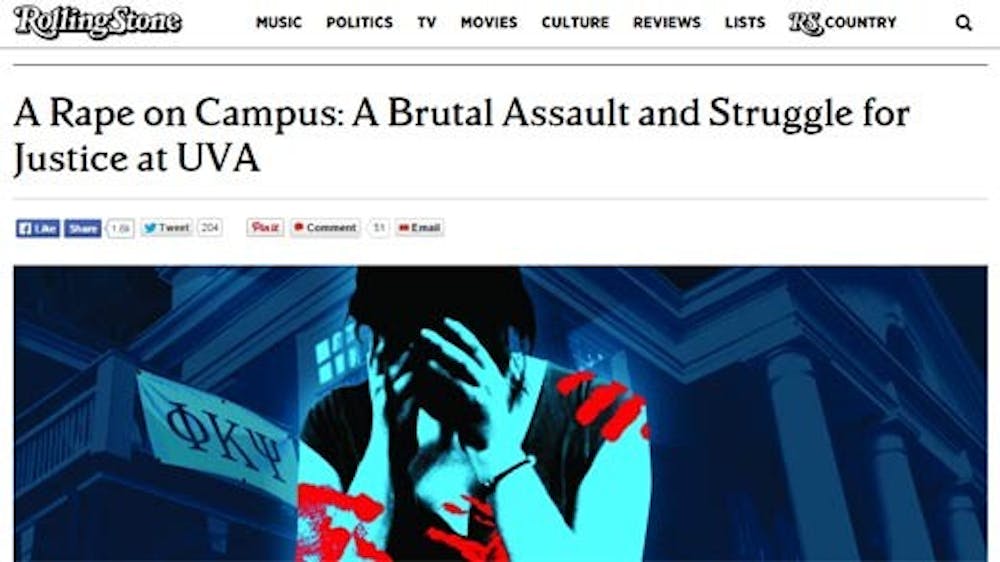It’s been two years since Sabrina Rubin Erdely’s article “A Rape on Campus” was published by Rolling Stone. The article — which has since been debunked — told the story of then-student Jackie, who was allegedly gang-raped at the Phi Kappa Psi fraternity house in Sept. 2012, and said she received little help from the University or her friends.
Ryan Duffin and Alex Stock were two of the three friends who helped Jackie the night after she was allegedly assaulted. Neither were interviewed for the article, but they were still mentioned — Duffin under the pseudonym Randall and Stock under Andy.
Duffin recalled reading the article for the first time in the Thornton stacks. He was vice president of his fraternity at the time and was planning to write something up about the article and send it to his fraternity’s listserv. Duffin said he had no idea the article would be about Jackie or would include him.
“I read it, realized what was going on and realized that I could in no way be impartial about it,” Duffin said. “I almost started crying in the middle of the Thornton stacks reading the article because the fact that it had been published at all felt like a betrayal.”
The article depicted a conversation between Jackie and her friends that never happened. Erdely wrote that the friends did not want Jackie to report her rape because they might all have to pay the “social price.”
“That conversation, frankly, was complete crap. It didn’t ever happen,” Duffin said. “I heard people saying, ‘Man I can’t believe that we share a school with people who would say that,’ and it’s tough to go around knowing that those people don’t go to a school with people who would say that because it was never said.”
Stock shared a similar point of view.
“I don’t think it was a particularly accurate portrayal,” Stock said. “I definitely would not have written off someone who had just been sexually assaulted. I would say the quotes were pretty much just made up.”
The article affected Duffin and Stock’s personal lives and changed the course of their entire academic years.
“It made for a very stressful but uniquely interesting third year at U.Va.,” Duffin said. “It’s very strange to find yourself in a scenario when you pick up your phone and someone says, ‘Hi, I’m calling from Megyn Kelly’s office, we’d like to have you on Fox News tonight.’”
Duffin and Stock were both contacted by several media outlets, and quickly learned how to balance interviews with studying for finals.
“There was a lot of pressure. It was third year, exam time, the rush before the holidays, a lot of work to do, multiple interview requests a day,” Stock said. “At that point I just told myself one interview a day and that would be it.”
Both former students said they believe the article may have had a positive effect on journalism, as the Columbia School of Journalism’s review of the article may have served as a warning to other publications about the importance of fact-checking.
“At the very least, Rolling Stone will be far more critical about its fact-checking procedures,” Duffin said. “I imagine that a lot of other media sources will do the same because the consequences of Rolling Stone releasing a story have been so drastic.”
Stock also worried the retracted article will lead to less trust in the stories of survivors of sexual assault.
“It portrayed all of us in the article, and the University, and survivors of sexual assault, in a negative light,” Stock said. “This kind of made-for-Hollywood script that turned out to be more or less a fabrication was the headline story for the year. I don’t think it did a service to anybody who was mentioned in it.”
Duffin agreed and said he hoped the article does not take away from survivor’s stories of sexual assault.
“This story is a very readily accessible anecdote if you will depicting a false sexual assault claim,” Duffin said. “I worry that the story as a whole has had the impact of causing people to not be as willing to believe survivors when they confide in them, and I really hope that’s not the impact that it has.”
Duffin said he wished the article would never have been published, and said it was something he never wanted to be associated with.
“It used to be fun for me to Google my name and see what’s there, and that kind of takes a lot of the fun out of that,” Duffin said. “It’s not the kind of story I would want my name associated with in the first place.”
Hailey Ross contributed to the reporting of this article.







